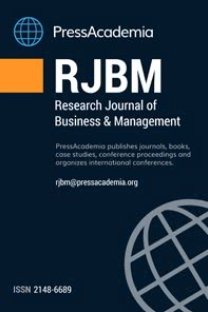PRODUCT LIFECYCLE MANAGEMENT AS A WHOLE BUSINESS MANAGEMENT SYSTEM: AN EXPLORATORY RESEARCH
Purpose - The aim of this paper is to define Product Lifecycle Management (PLM) Systems as a whole product focused management tool by featuring its importance for the enterprise integration management, product development and lean value systems. Methodology - The paper is designed as an exploratory study consists of several interviews with senior managers of ELTAŞ Transformer Sanayi ve Ticaret A.Ş. about the process management capabilities of PLM systems within a case study. Findings- The study reveals that non-technical processes like human resources can be managed using PLM methodology as well as the technical processes like product development. The results show the similarities of technical and non-technical processes, and show the possibility of managing even less technical processes to create a holistic business management tool. Conclusion- The study shows the importance of the PLM systems for the product-focused management while the digital transformation of the production companies and their enterprise integration management and lean value systems.
Keywords:
PLM, product lifecycle management product based business management, new product realization, ERP,
___
- Abel, M. (2008) "Competencies management and learning organizational memory", Journal of Knowledge Management, Vol.12 Issue: 6, pp.15-30 Anwary, M. (2005), Thesis, B.Sc.: “An Open Lifecycle Management System”, Ryerson University Bose, R. (2006) "Understanding management data systems for enterprise performance management", Industrial Management & Data Systems, Vol. 106 Issue: 1, pp.43-59 Cantamessa, M., Montagna, F., Neirotti, P. (2012),"Understanding the organizational impact of PLM systems: evidence from an aerospace company", International Journal of Operations & Production Management, Vol. 32 Iss 2 pp. 191 – 215 Cimalore, C. (2012) “Create collaboration between ERP and PLM”, Plant Engineering July/August 2012 pp. 29-32 CIMDATA LLC. (2011), “Product Lifecycle Management and the Data Deluge, transforming data to enhance performance”, http://www.cimdata.com/en/component/docman/cat_view/43-complimentary-reports/50-whitepapers CONTACT Software GmbH, (2015) “CIM Database PLM Presentation” CONTACT Software GmbH, CIM Database PLM Software V 11.0 Workflow Management and Task Manager Modules Screenshot Corbett, J. M. (2000) "On being an elephant in the age of oblivion: Computer‐based information systems and organisational memory", Information Technology & People, Vol. 13 Issue: 4, pp.282-297 ELTAŞ Transformer A.Ş., “New Product Development Procedure” Emerald Group Publishing Limited (2007) Information backbone: strong PLM investment. Strategic Direction 23(8): 32–34 Emerald Group Publishing Limited (2008),"Closing the PLM loop: The promise of capturing whole life product data", Strategic Direction, Vol. 24 Iss 4 pp. 35 - 37 Contact Software Corporate Report, (2015), Bremen Germany Gecevska, V., Stefanic, N., Veza, I., Cus, F. (2012) “Sustainable business solutions through lean product lifecycle management”, Bulletin of Engineering Tome V, Fascicule 1 pp. 135-142 Hines, P., Francis, M., Found, P. “Towards lean product lifecycle management: A framework for New product development”, Journal of Manufacturing Technology Management, Vol. 17 Iss 7 pp. 866-887 Laroche, F., Bernard, A., Bordeu, F., Chinesta, F. (2012) “Towards the factory of the future: An integrated approach of material-processesinformation-human being” Moon, Y. B. (2011), “Modeling and managing engineering changes in a complex product development process”, 2011 Winter Simulation Conference Otto, B. (2012),"Managing the business benefits of product data management: the case of Festo", Journal of Enterprise Information Management, Vol. 25 Iss 3 pp. 272 – 297 Peñaranda, N., Mejía, R., Romero, D., Molina, A. (2010) “Implementation of product lifecycle management tools using enterprise integration engineering and action-research”, International Journal of Computer Integrated Manufacturing, 23:10, 853-875 S A Partners (2004), Strategy Formation & Deployment, Unpublished Presentation. Yıldırım, Ali ve Hasan Şimşek (2008), Sosyal Bilimlerde Nitel Araştırma Yöntemleri, 7. Baskı, Seçkin Yayıncılık, Ankara
- Yayın Aralığı: Yılda 4 Sayı
- Başlangıç: 2014
- Yayıncı: PressAcademia
